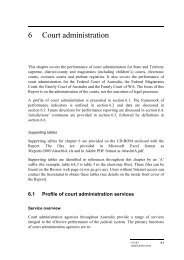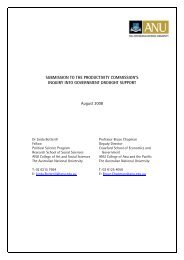7 Occupancy costs (PDF - 106 Kb) - Productivity Commission
7 Occupancy costs (PDF - 106 Kb) - Productivity Commission
7 Occupancy costs (PDF - 106 Kb) - Productivity Commission
Create successful ePaper yourself
Turn your PDF publications into a flip-book with our unique Google optimized e-Paper software.
landlord is contemplating an expansion of the centre. Without this clause, a landlord is<br />
not in a position to maintain the competitive edge of the centre.<br />
It is clearly in the interests of the tenants of the centre (as well as the landlord) for the<br />
landlord to be able to maintain the competitive edge of the centre. (confidential<br />
submission)<br />
Tenants, however, suggested that there were often instances where centre<br />
redevelopment adversely affected their business. The <strong>Commission</strong> was informed<br />
that tenants may be required to relocate to accommodate the redevelopment, or they<br />
may experience depressed sales as disturbance of the redevelopment temporarily<br />
reduces foot traffic. It was also submitted that some tenants experience a decline in<br />
trade after a redevelopment, particularly if there has been an expansion in the<br />
shopping centre and tenants face additional direct competitors. One participant,<br />
Bruce York, argued that:<br />
… landlords generally do not accept when they refurbish or extend a shopping centre<br />
that the impact on existing tenants businesses should be considered as part of the cost<br />
of these works. While some state regulations make reference to compensating tenants<br />
there is no agreed formula for so doing. My observation has shown that for reasonably<br />
significant landlord works the tenants businesses will be impacted up to 5 per cent<br />
assuming a well managed change, but some landlords do not properly control their<br />
building contracts and a loss of business up to 25 per cent and beyond can be expected.<br />
(submission no. 18, p. 6)<br />
In circumstances of redevelopment and relocation, some retailers argued that there<br />
should be access to rent review or short-term compensation in circumstances of<br />
changed conditions. The Pharmacy Guild of Australia, for example, suggested that<br />
the legislation should provide for access to a rent review on a market-value basis,<br />
where there is refurbishment of a complex, particularly where it continues over a<br />
long period of time and impedes traffic flow into a business (submission no. 109).<br />
These provisions already exist in most State retail tenancy regulations.<br />
7.2 Evidence on occupancy <strong>costs</strong><br />
<strong>Occupancy</strong> <strong>costs</strong> of retailers are explored in this section, together with the case for<br />
regulating such <strong>costs</strong>.<br />
<strong>Occupancy</strong> <strong>costs</strong> incurred by tenants<br />
<strong>Occupancy</strong> <strong>costs</strong> (per unit of lettable retail space) vary substantially between<br />
retailers according to the location of the premises leased and the retail amenity<br />
provided. On average, occupancy <strong>costs</strong> are lower outside of shopping centres, with<br />
136 THE MARKET FOR<br />
RETAIL TENANCY<br />
LEASES IN

















